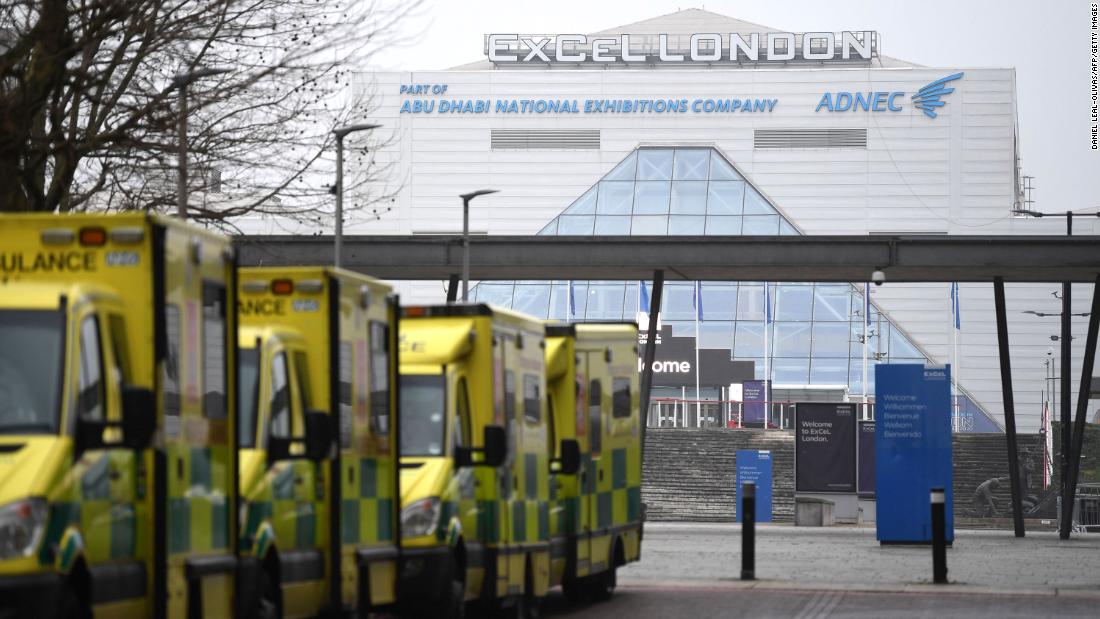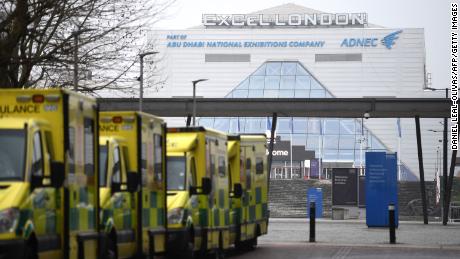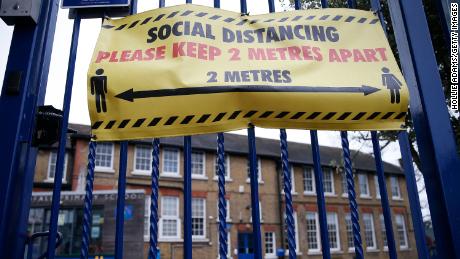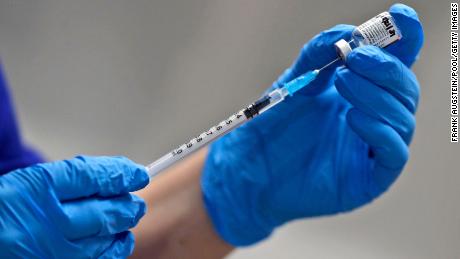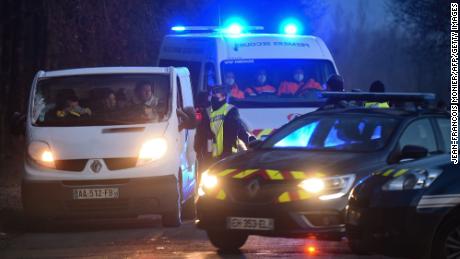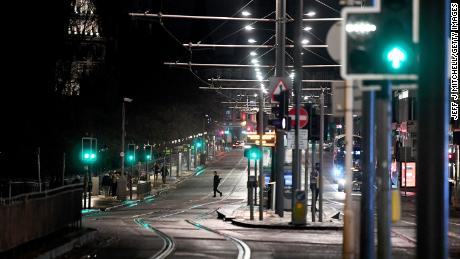A spokesperson for the National Health Service (NHS) told CNN on Saturday that those in charge of the field hospitals — hastily set up during the first wave of the pandemic but largely mothballed since — were asked on December 23 to “get services ready to use.”
Some London hospitals are now almost two-thirds full with Covid-19 patients, President of the Royal College of Physicians Andrew Goddard said Saturday.
His warning came as the UK recorded its highest daily rise in coronavirus cases since the pandemic began, with 57,725 new cases registered Saturday and a further 445 deaths, according to the government’s dashboard.
In an interview with CNN affiliate ITV News, Goddard said: “If you look at the data, some of the hospitals in London at the moment… almost two-thirds of their beds that are available are filled with Covid patients and that is just a staggering statistic and has to make us wonder if this is going to happen across the whole of the UK.”
“There is no doubt the new variant is more transmissible and the escalation of cases that we’ve seen in South Wales, London, Essex and the South East has been at a much greater rate than we’ve seen with the previous strains,” Goddard added.
According to the government’s latest healthcare data on January 1, there were 22,534 coronavirus patients in hospitals across England. This is higher than the almost 19,000 during the April peak.
Doctors have made impassioned appeals to the public to stay at home and follow government guidelines on social distancing as hospitals and other health care services come under intense pressure.
In another message posted Thursday, Pearse said: “Media reports of pressures on the NHS are all true. The situation in London is now MUCH worse than the first wave, and still deteriorating. Sad to see long queues of ambulances outside the hospital where I work.”
‘Record numbers’ of Covid patients
London Mayor Sadiq Khan told CNN that the capital’s hospitals were dealing with “record numbers” of Covid-19 patients on top of the normal, non-Covid winter surge in demand.
“We now have in the hospitals in London more Covid patients than at any time during this pandemic and the NHS in London, hospitals in London and our fantastic health workers in London are stretched,” Khan said Thursday.
Khan said he was “concerned” about hospitals becoming overwhelmed but added that the NHS had the flexibility to increase capacity, for example by canceling certain routine, elective surgeries.
“But the big worry we do have is, if we continue to see an increase in the virus spreading, it’s possible that hospitals won’t have the ability to cope and that’s particularly the concern because we have not yet reached the normal January, non-Covid peak,” he said.
Asked whether the military could step in to help with new patients, UK Defence Secretary Ben Wallace told Times Radio on Thursday: “Of course we stand ready to help with Nightingales if the critical pressures go beyond the capacity of the existing NHS.”
He said the Army currently had about 5,000 personnel deployed in the Covid-19 response.
Most of England is now under the toughest level of restrictions to try to limit the virus’ spread.
Amid the worsening situation, ministers were forced to reverse a decision to reopen some primary schools in London next week, after coming under pressure from local authorities and teaching unions. All schools in London will now switch to remote learning from Monday, when the new term starts, with only vulnerable and critical worker children allowed to attend in person.
The change of course came only two days after the UK Department for Education said nine London boroughs and the City of London would keep primary schools open, while those in 23 other boroughs would remain closed. Khan tweeted Friday that the government had “finally seen sense and U-turned” on its plan to open schools in some areas.
Vaccine roll-out plan
More than half a million doses of the Oxford/AstraZeneca vaccine will be available from Monday, according to UK Health Secretary Matt Hancock, with millions more to follow in the coming weeks.
Batches of the Oxford/AstraZeneca vaccine began arriving Saturday at hospitals in England, the PA news agency reported. Among the first to receive a batch was the Princess Royal Hospital in Haywards Heath, West Sussex.
Dr. George Findlay, chief medical officer and deputy chief executive for the Brighton and Sussex University Hospitals NHS Trust, said the hospital expected to give the vaccine to hundreds of people a day starting from next week.
The vaccine is cheaper and easier to distribute than the Pfizer/BioNTech jab, approved for use in the UK in early December, because it can be kept at regular refrigerator temperatures for at least six months.
The new strategy means that the interval between doses could be extended to up to 12 weeks, instead of the three weeks previously stipulated. However, Pfizer has said it has no data to show that just a single dose of its vaccine would provide protection against the disease after more than 21 days.
The deputy chairman of the UK’s Joint Committee on Vaccination and Immunisation, Anthony Harnden, defended the dosing strategy in an interview Saturday with the BBC.
“We’re not saying you shouldn’t have a second dose. We’re saying the second dose can be temporarily delayed to get more people vaccinated,” Harnden said. “We’re in a dire situation in this country at the moment, the virus is rapidly spreading and the more vaccine we can get into these priority groups, the more deaths and hospitalizations we can prevent.”
UK regulators have also advised giving the second dose of the newly approved Oxford/AstraZeneca vaccine four to 12 weeks later.
New variant more prevalent in under-20s
Even if the government achieves its aim of swiftly inoculating millions of elderly and clinically vulnerable people, thereby reducing Covid-related hospital admissions, the UK faces some tough weeks ahead.
“It is a pretty grim and depressing picture at the moment” in England, Deputy Chief Medical Officer Jonathan Van Tam told a Downing Street press conference on Wednesday.
“It is almost certainly true that the NHS has not yet seen the impact of the infections that will have occurred during mixing in Christmas and that unfortunately is rather sobering.”
As of January 1, at least 30 countries, including the United States, had reported cases of the more infectious variant of the coronavirus first detected in the UK.
A study authored by a collaborative team from Imperial College London, University of Edinburgh, Public Health England and others confirmed that the variant had greater transmissibility and was more prevalent in people under 20 years of age.
While the study, released Thursday, found that people aged under 20 make up a greater proportion of cases of the new variant of the virus, its authors said it was too early to determine the reasons for this, adding that further research was ongoing.
There’s no evidence that the variant is any more deadly or causes more severe disease, according to health officials.
CNN’s Sarah Dean, Eleanor Pickston, Sharon Braithwaite and Hira Humayun contributed to this report.

